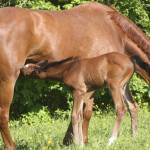Alfalfa: When Is It the Right Choice for Horses?

When the word “alfalfa” is bandied about among horsemen, most immediately think of high-quality forage, a vividly green, sweet-smelling, leafy legume. Like all forages, though, not all alfalfa (lucerne) is grown, cured, or harvested identically, which makes the hay’s ultimate quality variable.
Differences in growing conditions and harvesting methods impact nutritional quality. Alfalfa hay can be off-colored, dusty, moldy, or weed-ridden, just as any grass hay might be. Therefore, it important to carefully evaluate any alfalfa hay intended for horses. If you are uncomfortable with this task, drag along an experienced hay buyer when it comes time to fill the hay-mow.
Most people can distinguish high-quality hay because its color is often bright and the smell is sweet and pure. An experienced cohort will help you choose between alfalfa that is likely rich in energy and nutrients, and alfalfa that is inferior in one way or another. Word of caution: do not let color be the only determining factor. Alfalfa hay does not need to be fluorescent green to be appropriate for horses. Good-quality hay comes in all shades of green. Forage testing by an accredited laboratory can reveal the nutrient composition of the forage and is the best measure of adequacy for horses.
Which horses benefit most from the inclusion of alfalfa hay in their diets?
Young horses. Good-quality alfalfa hay is appropriate for weanlings, yearlings, and other young horses. Keep in mind that alfalfa usually has more energy per equal weight of a grass or mixed (grass/legume) hay. Therefore, less alfalfa hay may be fed to meet energy requirements. Alfalfa hay will not meet all of the young horse’s nutrient requirements, however. A concentrate specifically formulated for weanlings should be fed alongside the alfalfa hay. If the concentrate and alfalfa combination provides too much energy, a balancer pellet or vitamin and mineral supplement will supply essential nutrients.
Performance horses. Certain performance horses, especially those involved in demanding work, cannot maintain their weight on grass forage, and need the calorie boost provided by alfalfa. Some horsemen shy away from alfalfa hay for exercising horses because of its high protein content, but experts state there is no reason to do so. Excess protein is excreted without harm to the horse.
Lactating mares. Producing milk is an energy-draining job, and broodmares sometimes require the richest forage available to produce high-quality milk while simultaneously maintaining reasonable body condition. When coupled with a calorie-dense concentrate formulated for mares, alfalfa hay provides a well-rounded diet for lean, high-producing broodmares.
Hard keepers. Some horses do not gain weight easily, even after a wellness check by a veterinarian rules out problems with teeth, gastric ulcers, or hindgut acidosis. Because only so much concentrate can be fed to such an individual, the logical next step is to feed forage with the greatest energy density, and this is often high-quality alfalfa hay.
Palatability. Few horses refuse alfalfa hay, especially when it is premium quality. Horses lose their desire to eat for several reasons. At times it becomes critical to offer the inappetent horse a palatable forage. Aside from fresh, green grass, alfalfa is the likeliest choice. Premium alfalfa is chock-full of leaves, which are the most nutrient-dense portion of the hay plant. By vigorously shaking a flake of alfalfa, leaves may drop. Collecting the leaves and offering them to the horse may stimulate appetite.
Availability. In some regions of the world, alfalfa hay is all that is available and is therefore the most economical choice. Practicality and cost of feeding are always considerations when devising a feeding plan for horses.
Alfalfa hay would not be the best forage for certain groups of horses.
Young horses predisposed to growth problems. Feeding a surplus of energy to young horses, especially weanlings, can often lead to growth problems, including contracted tendons. Feeding alfalfa hay would not be appropriate for young horses that show a propensity for growth problems. A good-quality grass hay, in addition to a ration balancer or vitamin and mineral supplement, would likely be the best choice in such a scenario.
Easy keepers. Horses that can maintain their weight easily should not be fed alfalfa hay. Energy requirements would be better met by supplying a lower quality grass hay (though not dusty, moldy, or otherwise unsafe). With fewer calories per mouthful, easy keepers will be able to eat more, which will satisfy the urge to chew as well as keep the gastrointestinal tract in motion.
Performance horses in good flesh. Most performance horses can maintain their weight on good-quality grass forage, and this seems to be particularly true of horses with warmblood, draft, or pony ancestry. Offering alfalfa hay to these horses, especially in regions where there is an appreciable price difference in grass and alfalfa hay, would be unnecessary.
To determine if alfalfa hay fits into your feeding program, consult with an equine nutritionist.








